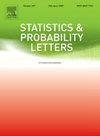偏差与平均绝对偏差之间权衡的下限
IF 0.9
4区 数学
Q3 STATISTICS & PROBABILITY
引用次数: 0
摘要
在非参数统计中,最优估计率通常会兼顾偏差和随机误差。最近关于超参数化的研究提出了一个问题:是否存在不服从这种权衡的最优估计率?在本研究中,我们将考虑在高斯白噪声模型中,用一类 β-Hölder 平滑函数中的回归函数 f 进行点估计。让 "最坏情况 "指的是 Hölder 类中所有函数 f 的上集。结果表明,任何具有最坏情况偏差≲n-β/(2β+1)≕ψn 的估计器,其最坏情况平均绝对偏差的下限必然也是≳ψn。为了推导出这一结果,我们建立了有关两个概率度量的期望变化与平均绝对偏差的抽象不等式。本文章由计算机程序翻译,如有差异,请以英文原文为准。
Lower bounds for the trade-off between bias and mean absolute deviation
In nonparametric statistics, rate-optimal estimators typically balance bias and stochastic error. The recent work on overparametrization raises the question whether rate-optimal estimators exist that do not obey this trade-off. In this work we consider pointwise estimation in the Gaussian white noise model with regression function in a class of -Hölder smooth functions. Let ’worst-case’ refer to the supremum over all functions in the Hölder class. It is shown that any estimator with worst-case bias must necessarily also have a worst-case mean absolute deviation that is lower bounded by To derive the result, we establish abstract inequalities relating the change of expectation for two probability measures to the mean absolute deviation.
求助全文
通过发布文献求助,成功后即可免费获取论文全文。
去求助
来源期刊

Statistics & Probability Letters
数学-统计学与概率论
CiteScore
1.60
自引率
0.00%
发文量
173
审稿时长
6 months
期刊介绍:
Statistics & Probability Letters adopts a novel and highly innovative approach to the publication of research findings in statistics and probability. It features concise articles, rapid publication and broad coverage of the statistics and probability literature.
Statistics & Probability Letters is a refereed journal. Articles will be limited to six journal pages (13 double-space typed pages) including references and figures. Apart from the six-page limitation, originality, quality and clarity will be the criteria for choosing the material to be published in Statistics & Probability Letters. Every attempt will be made to provide the first review of a submitted manuscript within three months of submission.
The proliferation of literature and long publication delays have made it difficult for researchers and practitioners to keep up with new developments outside of, or even within, their specialization. The aim of Statistics & Probability Letters is to help to alleviate this problem. Concise communications (letters) allow readers to quickly and easily digest large amounts of material and to stay up-to-date with developments in all areas of statistics and probability.
The mainstream of Letters will focus on new statistical methods, theoretical results, and innovative applications of statistics and probability to other scientific disciplines. Key results and central ideas must be presented in a clear and concise manner. These results may be part of a larger study that the author will submit at a later time as a full length paper to SPL or to another journal. Theory and methodology may be published with proofs omitted, or only sketched, but only if sufficient support material is provided so that the findings can be verified. Empirical and computational results that are of significant value will be published.
 求助内容:
求助内容: 应助结果提醒方式:
应助结果提醒方式:


